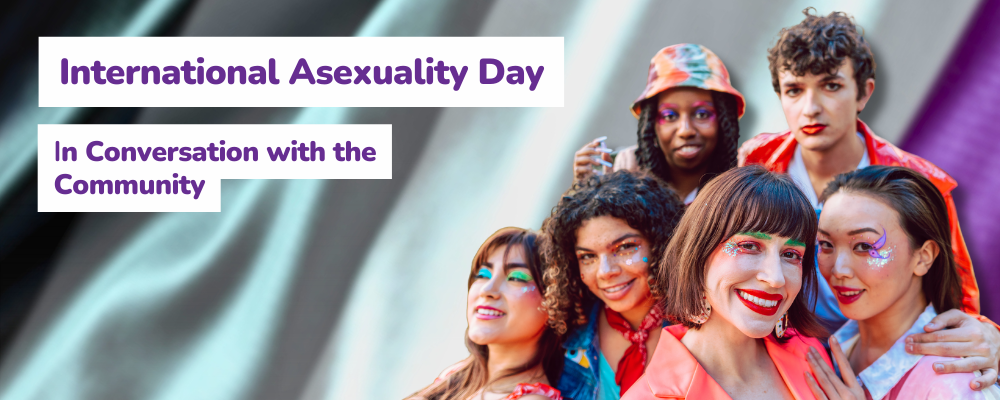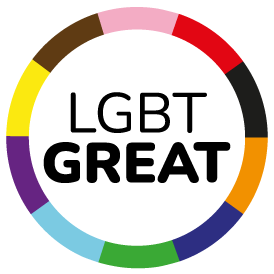International Asexuality Day: In Conversation with the Community

April 6th marks the 4th ever International Asexuality Day- a worldwide campaign designed to bring awareness to the experiences and challenges faced by individuals identifying within the asexual spectrum.
Asexuality is an identity under the LGBTQ+ umbrella that, in its broadest sense, encompasses people with a low or non-existent interest in sexual activity with others. As asexuality is a spectrum, many asexual individuals have unique experiences of sexual desire or sexual activity. Sexual desire does not encompass romantic desire- and many asexual individuals experience romantic and platonic connections without a need to include any sexual behaviour in these dynamics.
In the heteronormative world we live in, we all face an expectation to experience and act upon sexual desire towards individuals of a different sex or gender to us- but even within the LGBTQ+ community, asexual individuals can face judgement or discomfort for an absence of sexual desire. This social stigma has implications for the welfare and wellbeing of asexual individuals. The ACE in the UK report by Stonewall found that half of ace (asexual) people (49%) weren’t out to any colleagues, more than twice the rate of all LGBTQ+ respondents (18%). Furthermore, in healthcare settings, asexual people were around 50% more likely to have never told healthcare staff about their asexuality, with a quarter (24.3%) citing that they were afraid of a negative reaction, and 8.4% citing that they had had a bad experience in the past. 41.8% of ace respondents also struggled with their mental health, most commonly with anxiety or depression.
Here at LGBT Great, we greatly value the power of lived experience and uphold the practice of creating a platform for others. In wishing to platform asexual experiences, we have brought in two voices to speak on different experiences within the asexuality spectrum. Sarah Gogniat is a Marketing Assistant working in media and Abbi Udell is an Illustrator working both in product development and freelance as a greeting card designer. In this interview with LGBT Great’s Insights & Content Analyst, Georgie Williams, both interviewees discuss navigating the professional world as asexual individuals and facing different challenges with regards to asexuality awareness and acceptance. Sarah and Abbi’s responses to the questions below are indicated by ‘SG’ and ‘AU’ respectively.
What does being asexual mean to you, and what do you wish to celebrate about it?
AU: Being asexual is an important aspect of my identity. It affects my relationships, my life goals, the way I consume media, and the way I interact with others. I want to celebrate the sense of community and self-recognition that the asexual label has given me; of course, labels aren't for everyone, but for me it meant the discovery that there wasn't something wrong with me. I celebrate the experiences I share with others on the ace spectrum, as well as our many differences!
SG: Being asexual to me is… I feel like I don’t fall under a certain part of the asexual umbrella. There’s demi[sexual], grey[-asexual], I don’t fall under one of those, so I tend to generalise my identity with asexuality- that’s what it is for me, not being constrained by the box I identify with.
How has your asexuality been received or supported during your career? Have you faced challenges?
AU: I have actually been quite lucky here. While I didn’t come out to my coworkers immediately, they follow my social media where I post about being ace/pan. My boss saw my post on Coming Out Day and sent me a message expressing his support, asked about my own and my partner’s labels in a non-invasive way, and mentioned having an asexual relative. I remember feeling a huge sense of recognition and relief - I hadn’t been at the company long, and it was the early days of the pandemic when there was an increased fear that any little thing could cost you your job, so having that reassurance that my queerness wouldn’t be the end of my career was a weight off my shoulders. I know so many people are not so lucky.
Since then, I slowly started being more open about my sexual and romantic orientation at work. I now work with a team to promote a safe environment for our queer employees and encourage enthusiastic allyship from the rest of the company, through education and awareness. I came out quite publicly to a huge chunk of the company as part of this, and luckily had full support from a lot of people.
In my personal experience, school was a far more hostile place to be asexual than work. Discussions on sex aren’t as common in the office, and words like “frigid” and “prude” aren’t thrown around quite so much, but there can still be uncomfortable situations. It’s hard to overhear colleagues misusing the word ‘asexual’ (like the other day, when a coworker referred to a non-human, non-gendered character as asexual), or voicing harmful misconceptions about asexuality. In a professional environment, you’re faced with the tough choice between keeping quiet in your discomfort, or calling out your coworkers in a room full of people you have to spend several hours a day with.
SG: I am quite fortunate in that the people who I have mentioned my asexuality to have been quite normal in their response! It hasn’t been presented as this like, weird thing, but also these people have- I’ve only really mentioned it to queer people because people who are cishet won’t usually understand it, and I don’t really want to delve into my personal life with this person. At this point I haven’t had many difficulties with it, but we shall see what the future holds- things are definitely getting more progressive.
What guidance do you have for organisations looking to better recognise and support the needs of asexual workers?
AU: I think there are two major problems faced by asexuals in a world that places so much value on sex and relationships. One is how difficult it is to figure out your sexuality, essentially trying to spot the absence of something we may not even recognise; and the other is outside pressure to “fix” what is perceived as “broken”.
Awareness and education goes a long way to chipping away at both issues. Georgie gave a wonderful general overview on queer issues at my company in their previous role, and it became clear how few people had any idea what asexuality was. Even in queer spaces, it’s often misunderstood. Increased awareness not only helps asexual employees feel understood and validated, but it also gives people the tools and space to realise their own asexuality. I was lucky to find that label early on because I spent time in queer spaces, but most people don’t have that luxury and it’s incredibly difficult to figure out on your own. Providing workers with ace resources and education can help people to better understand their own experiences regarding sexual and romantic attraction.
Mental and physical health resources would also greatly support asexual workers. As an asexual, it can be difficult to find information on things like sexual and reproductive health that’s relevant to me. It can also be dangerous territory for anyone who hasn’t come to terms with their asexuality yet, as an overwhelming number of medical resources cite low or no sex drive as a symptom of various physical or mental illnesses. Access to resources reassuring that asexuality is not something to be cured, and advice on navigating personal relationships is something organisations can easily provide their workers.
Lastly, having an HR department that listens to the needs of queer employees is really important. This reassures ace employees that any concerns they have will be taken seriously, and it’s comforting to know that, should the situation arise, HR will be fighting your corner.
SG: I did mention this in our webinar, I think it might be good for organisations to organise some kind of workshop with an asexual speaker, and then people who attend the workshop can ask questions and there can be a discussion where people educate each other- education is a very powerful tool! I think little things they can do is posting during pride month, supporting LGBTQ+ workers and having signs and flags around. I guess in the scope of asexuality, maybe not trying to pry too much into the personal, intimate aspects of it is important. There is a boundary that lots of asexual people don’t want crossed except for with partners, and it is a fine line to figure out- but this is where I think getting workshops running can help people understand these boundaries.
